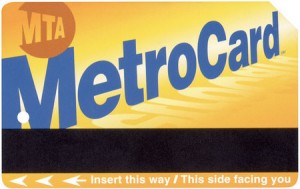 If you’re upset about the cuts in service the MTA is proposing and the fare increases, there’s a meeting on Wednesday that will be off interest. We got an email from Tom Gray at Council Member Bill de Blasio’s office that has been circulated widely. The Public Hearing takes place tomorrow night (Wednesday, January 28) at the Brooklyn Marriott from 6PM-9PM, which is located at 333 Adams Street. Among the issues in Mr. de Blasio’s district alone is the possible elimination of the B16, B23, B37 and B75 entirely along with the end of weekend service on the B71 and overnight service on the B67 and B77. Station Agents would be cut from the Metrotech end of the A, C and F station at Jay Street; the west side of Flatbush Avenue entrance to the Bergen Street 2, 3 station; the southbound F and G station entrance at Bergen Street; the northbound entrance to the Carroll Street F- and G-train station; and the entrance to the Borough Hall 2, 3, 4 and 5 trains at Court and Joralemon streets. There would be reduced frequency of service weekends on F and R and increased crowding during off-peak on F, R, 4 and 5 lines. There could be a total elimination of M service between lower Manhattan and
If you’re upset about the cuts in service the MTA is proposing and the fare increases, there’s a meeting on Wednesday that will be off interest. We got an email from Tom Gray at Council Member Bill de Blasio’s office that has been circulated widely. The Public Hearing takes place tomorrow night (Wednesday, January 28) at the Brooklyn Marriott from 6PM-9PM, which is located at 333 Adams Street. Among the issues in Mr. de Blasio’s district alone is the possible elimination of the B16, B23, B37 and B75 entirely along with the end of weekend service on the B71 and overnight service on the B67 and B77. Station Agents would be cut from the Metrotech end of the A, C and F station at Jay Street; the west side of Flatbush Avenue entrance to the Bergen Street 2, 3 station; the southbound F and G station entrance at Bergen Street; the northbound entrance to the Carroll Street F- and G-train station; and the entrance to the Borough Hall 2, 3, 4 and 5 trains at Court and Joralemon streets. There would be reduced frequency of service weekends on F and R and increased crowding during off-peak on F, R, 4 and 5 lines. There could be a total elimination of M service between lower Manhattan and
Bensonhurst (That means 16 fewer trains on the 4th Avenue line during the rush hour mornings; and 12 in the p.m. rush. As a result, rush-hour waits will double and crowding will greatly increase on the
R.) The G would terminate at Court Square all the time (now goes from Smith-9th to Forest Hills on weekends, nights)
Then, of course, there are the fare hikes. Bus and subway fares could go up to as much as $3.00. Express buses could go to $6.25. The price of Unlimited Ride MetroCards could go to as much as $9.50 for a 1-day card, $32 for a 7-day card, $60 for a 14-day card and $105 for a 30-day card.
Here’s more from the de Blasio email:
Make Sure Your Voice is Heard. Tell the MTA these cuts and hikes are unacceptable! Riders in this City already fund a disproportionate amount of the transit system, and the MTA’s proposed service cuts would prove dire for millions of working New Yorkers. Despite tough economic times, straphangers should not be forced to bail out the MTA. Tell the MTA there is another solution to this problem – reinstating a commuter tax could create similar revenue without placing the entire burden on our City’s residents.
Join Bill at the MTA hearing on January 28th in standing up for straphangers. If you plan to attend the hearing or have questions, please e-mail Bill at deblasio@council.nyc.gov. We also invite you to e-mail us about how these cuts and fare hikes personally affect you. More information about the hearing and the proposed cuts and fare increases can also be found at www.mta.info.
There are more meetings coming too.

4 responses so far ↓
1 Benjamin Kabak // Jan 28, 2009 at 1:26 am
If de Blasio doesn’t want these service cuts and fare hikes, is he willing to support tolling the East River Bridges? That move would impact about 3 percent of Brooklynites on a daily basis as compared to MTA cuts and hikes which would impact approximately 20 to 25 times more people.
2 Second Ave. Sagas | A New York City Subway Blog » Blog Archive » » Waiting for Senator Schumer // Jan 28, 2009 at 1:54 am
[…] Brooklyn takes center stage as the MTA brings its hearings circuit our way. Council members are urging vocal protests, but where’s our solution? Will Bill de Blasio support tolls that impact just 3.1 percent of […]
3 Streetsblog » Congestion Pricing Foe Bill de Blasio (Grand)Standing Up for Straphangers // Jan 28, 2009 at 12:22 pm
[…] Tonight, the MTA will host a public hearing in Brooklyn, where the agency will undoubtedly hear from scores of residents terrified by the prospect of elimination or reduction of service on several of the borough’s bus and subway lines. The self-appointed leader of the charge will be candidate for public advocate and current City Council Member Bill de Blasio, who sent out this e-mail blast ahead of tonight’s hearing (via Gowanus Lounge): […]
4 Dave Switzer’s Blog » Thou Dost Protest Too Much // Mar 6, 2009 at 12:50 pm
[…] protests. When states try to decrease the quality or quantity of services they provide, still more protests. And when states increase the price of government services (public transportation, for example), […]